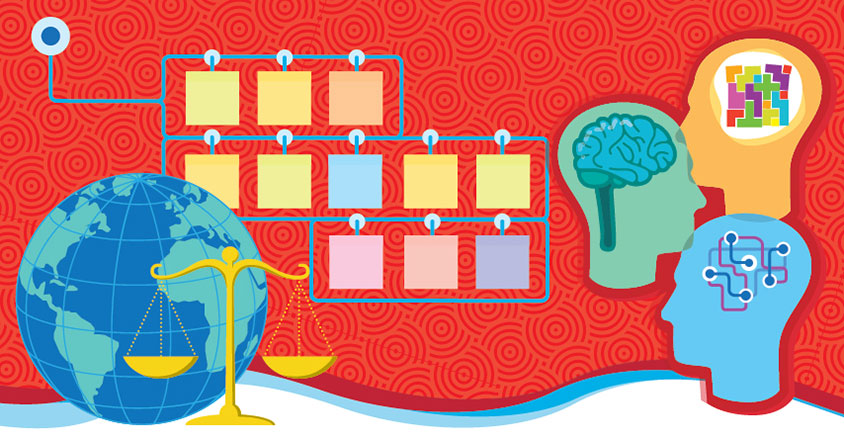New Fields of Study for Today’s Students

Now more than ever, the world needs thinkers, leaders, innovators who can face the challenges and opportunities of the 21st century—with knowledge and tools, vigor and ethics. That’s why an ever-evolving strategic priority for Whitman College is a commitment to the liberal arts and to shaping a dynamic curriculum that can respond to these needs.
Whitman faculty have responded as innovators in their own right, creating new majors and programs. Here’s a look at some of these new fields of study being introduced in Fall 2023.
New Major: Brain, Behavior & Cognition
This new major integrates biology and psychology as they apply to neural science. Students majoring in Brain, Behavior and Cognition (BB&C) will explore the workings of the nervous system, in both human and animal models—and make connections between the science of the mind and the science of the brain.
“Bridging these departments will give students an opportunity to study each discipline as they work together in the brain rather than having to study both separately,” says Nancy Day ’05, Assistant Professor of Psychology. “Having a major that combines both Biology and Psychology is a major I wish I had when I went to school at Whitman.”
After Day joined Whitman in 2019, she worked closely with Ginger Withers, the Dr. Robert F. Welty Professor of Biology, to craft the new major. Day graduated with a double major in Psychology and Biology and is a former student of Withers.
And according to Withers, students aren’t limited to Psychology and Biology courses—they may take relevant classes in Philosophy, Rhetoric or Economics. “There are a lot of classes across our campus that fit into the new major,” says Withers. After Whitman, students can go in many different career paths because the major has a strong and practical anchor in the sciences, she says.
New Major: Ethics & Society
Whitman’s Philosophy Department will introduce a new Ethics and Society major. Students who pursue this new major will consider philosophy through the lens of ethical and social issues, such as climate change ethics, criminal justice and punishment, biomedical ethics, animal rights, and racial and gender justice.
“Many of our students are keenly interested in questions of how we ought to act and interact with the people and world around us,” says Michelle Jenkins, Associate Professor of Philosophy and Chair.
For their senior capstone projects, Ethics and Society majors will be tasked with collaboratively undertaking a public-facing project that develops their abilities to understand, critically analyze and publicly communicate a complex moral question or issue.
New Concentration: Human-Centered Design
A working group of faculty from across campus and disciplines has brought this new concentration to the Whitman curriculum. The study of Human-Centered Design (HCD) encourages students to understand the deeper meaning of objects, spaces, systems and beyond—and how to evaluate people’s interaction with the designed world.
“HCD threads together multiple disciplines at Whitman in order to wrestle with challenging puzzles in today’s society, from climate change to accessibility and inclusivity in our digital and physical worlds,” says Michelle Janning, the Raymond and Elsie DeBurgh Chair of Social Sciences and Professor of Sociology.
“With Human-Centered Design, we’ve found a subject and lens that will bring many departments together,” says Janet Davis, Associate Professor and Microsoft Chair of Computer Science, and HCD Co-Director. “It’s a design process that takes people into account every step of the way.” Janning, Davis and colleagues have seen interest in this type of work in both recent graduates and students.
“They’re moving in that direction and we want to help them in that,” says Associate Professor of Art Justin Lincoln, Co-Director of the new program with Davis.
The working group believes that Human-Centered Design also aligns with Whitman’s core values. It is guided by principles of belonging, inclusivity and empathy and works to help students respond to essential needs and problems that are embedded in unequal and unjust systems and structures. One alum working in the field of design thinking, Katie Krummeck ’03, introduced the wider Whitman community to this specialty during her innovative and virtual Commencement speech in May 2020.
{{1-right}}
As an educational designer, Krummeck is an international leader in leveraging the power of design to drive change in K-12 education, with expertise in and a passion for creating learning experiences that develop students’ creative confidence, optimism and problem-solving skills. More recently, Krummeck came to campus to present a workshop—Design Thinking: A Methodology for Teaching Creative Problem-Solving—in Janning’s Sociology 294 course, Designing Contemporary Childhoods.
A Practical & Powerful Process
Beginning in Spring 2024, students will be able to take HCD 101, where they’ll learn and experiment with the basics of Human-Centered Design, including these practices for design processes that can positively impact community, culture and the environment:
Empathize —> Understand the need
Frame —> Define the problem
Brainstorm —> Generate possibilities
Prototype —> Model solutions
Evaluate —> Test and share/solicit feedback
Iterate —> Revise and improve
Why a Concentration Versus a Major or Minor?
To the faculty working group, it became clear that HCD was a positive addition to any major. The concentration approach allows students to gain competency in HCD without limiting their choice in a major or minor. Students can choose HCD-related courses that fit their interests, different audiences and the kinds of problems they are trying to solve.
Major+French: New combined major options
Whitman students can now pair several majors with French in a new offering called Major+French. Majors in Biology, Geology, Psychology, Religion and Sociology can now enhance their major with an emphasis and coursework in French.
It is the equivalent of a minor but with more intention about how the subjects pair together, according to Sarah Hurlburt, Professor of French and Francophone Studies and Chair. “The piece you have to look at is the integrated component. We aren’t going to teach special French psychology. We are working with the students so they can be intentional about incorporating language skills into their larger goals, for example by incorporating sources in French into their thesis project or presenting in French about their research,” Hurlburt says. Studying and working abroad make this option valuable and practical. “More people outside of France speak French than in France,” Hurlburt says and cites Western Africa, Eastern Canada, Belgium and Luxembourg as places with high French-speaking populations.
When Major+French was first introduced, Geology was not an option. Owen Gaul ’25 worked with professors across disciplines to add it.
“I think it is really important to speak different languages and interact with people from different parts of the world,” Gaul says. The sophomore from Divide, Colorado, is proud that this idea and collaborative work now makes Geology+French available to other students. “This is why I chose to come to a small liberal arts college.”
New Minor: Finance
In a global and ever-changing economy, an understanding of economics and finance can be valuable in many, if not most, career fields.
Whitman’s Economics offerings now include the option for Whitman students to add a minor in Finance to their major by taking certain courses, such as Financial Accounting, Corporate Finance, Money and Banking, and International Finance. Whitman’s faculty in Economics will work collectively to make this option available to current and future students and to continue to innovate their curriculum.
The Innovators
Brain, Behavior & Cognition Biology: Ginger Withers and Christopher Wallace
Psychology: Nancy Day, Walter Herbranson and Matthew Prull
Ethics & Society (Philosophy): Mitch Clearfield, Patrick Frierson, Rebecca Hanrahan, Julia Ireland, Michelle Jenkins
Human-Centered Design
Art: Justin Lincoln
Computer Science: Janet Davis and William Bares
English: Sharon Alker
French and Francophone Studies: Sarah Hurlburt
Sociology: Michelle Janning
Theater: Daniel Schindler
Major+French: Sarah Hurlburt and Jack Iverson
